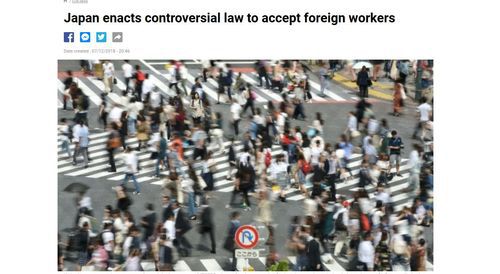
Japan To Bring in More Foreign Workers. Is This a Slippery Slope?
By Allan Wall
12/12/2018
Many of us have admired Japan’s tight immigration policy, which protects its own people rather than flooding the country with foreigners working cheaper. Japan wants to remain Japanese.
But could that change ? France24.com reports that Japan passed a law to bring in over a quarter million workers:
Japanese Prime Minister Shinzo Abe’s ruling coalition early Saturday [December 1] rammed through legislation to bring more blue-collar foreign workers into the country, in a controversial move to address chronic labour shortages. The bill was enacted after the upper house gave approval despite a raft of criticism by opposition parties following its passage through the lower house in late November. Both chambers are controlled by Abe’s ruling camp.
Japan enacts controversial law to accept foreign workers, AFP, Dec. 7, 2018
The new law could bring in over a quarter of a million foreign workers.
Under the new system, the government plans to bring in as many as 345,000 foreign workers in construction, food services, nursing and other designated sectors for five years. "We aim at starting it in April next year because we need to swiftly launch the new system in order to deal with the current labour shortage," Abe told parliament on Thursday [December 6].
More concerning than the actual number of workers is the reasoning used to support it — the "labour shortage" argument. This can easily develop into the standard justification for bringing in more and more workers. Could this be a slippery slope?
There is opposition.
But opposition parties claimed that the law fails to address the potential impact on Japanese society of new foreign labour, and does not protect foreign workers' rights. In a bid to block its passage, opposition parties submitted censure motions against Abe and Justice Minister Takashi Yamashita, but they were easily rejected by the ruling bloc.
The new law is still, of course, tougher than our system, which isn’t saying much.
The law allows foreign nationals with skills in sectors facing particularly severe shortages to obtain five-year visas, which would not allow them to bring their families. Foreign workers in those fields who hold stronger qualifications and pass a more difficult Japanese language test will be able to obtain a visa that can be extended indefinitely, eventually leading to residency, and will be able to bring over family.
However …
But there have been questions about whether an influx of foreign workers will depress wages, how the workers will be incorporated into Japan’s social security system, and worries about exploitation of migrant labour.
Many of Japan’s low-skilled foreign workers are in the country under a so-called "technical training" programme, which has repeatedly faced allegations of abuse.
"We should not create a new system hastily without reviewing the technical training programme in which problems are mounting," Yoshifu Arita, an opposition lawmaker, told parliament.
Good point.
But even in Japan businesses complain about a worker shortage.
Businesses have long lobbied for looser immigration rules, saying they struggle to find workers in a country where unemployment hovers around 2.5 percent. The chronic labour shortages are only worsening as Japan’s ageing and shrinking population means a declining pool of workers.
A nation must have enough babies to survive, but there is no miminum necessary population for a country’s economy, which will adjust to its population. And with mechanization, the Japanese ought to be able to make it. After all, the country is a pioneer in robotics.
Keep an eye on Japan.
